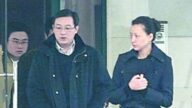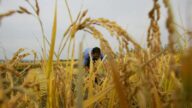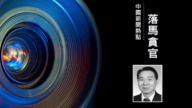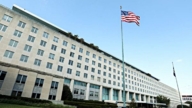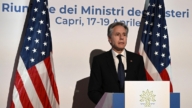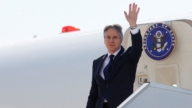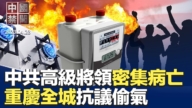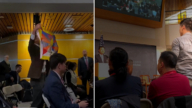【新唐人2013年06月06日訊】美國《國際先驅論壇報》網路版,6月4號刊登長文指出,現任中共高層中,不少人經歷了1989年的政治風暴,他們與1989年的那場民主運動有著密切和矛盾的關係。是甚麼關係﹖請看本臺記者的報導。
《國際先驅論壇報》的文章開篇就提到,1989年4月,400名中國政治精英聚集在北京,連續四天焦慮的辯論著國家的未來。
組織那次會議的,時任中國體制改革研究所所長陳一諮說:「不可能再召開像那次那樣,每個人都願意直抒己見的會議了。」
但幾天以後,天安門廣場爆發了抗議活動,與會者的人生從此走上了截然不同的道路。
現任中共25名政治局高官中,有6人參加了那次會議,其中包括現任的總理李克強、國家副主席李源潮、中紀委書記王岐山、以及全國政協主席俞正聲等;另一些與會者,有的被指控支持抗議活動而被監禁或者流亡國外。
時政評論家陳破空:「不僅學生、市民、工人、甚至包括農民都支持學生。而且像《人民日報》、中直機關(中央直屬機關)這些單位,很多人站出來造了共產黨的反,抗議政府,站到學生一邊。即便共產黨內部,政治局常委裡邊,5個人就有2個是反對鎮壓的。人大常委會裡邊,1個委員長、6個副委員長都反對鎮壓。而元老裡邊,包括習近平的父親習仲勳就反對鎮壓。」
旅美時政評論家陳破空指出,現在能登上中共高位的,都是內部討價還價的結果,像受到元老猜忌的李源潮、汪洋,仕途受影響。
《國際先驅論壇報》的文章還指出,在六四鎮壓之前的80年代後期,中國政治環境一度相對寬鬆自由,李克強在「北大」讀書期間,就與當時參加「北大」競選、「六四」後流亡美國的異見人士胡平和王軍濤有來往。王軍濤曾回憶說,李克強當時和他們有許多相同觀點。
而流亡美國的政治異見人士陳一諮也透露,他曾和王岐山有過多次長談,在1988年也和李克強作過長談。他的印象是,他們當時相對的比較開明。但報導中,王軍濤說,「在(中共)黨內生存,你必須成為一個機會主義者。」
政論家胡平也表示,在89民運時期,中央一些部門1/3的人都上過街、游過行,在體制內高層,同情學生的也佔很大比例,甚至現在成了毛左派的那些著名知識份子,當時都是參加民運的。
美國中文雜誌《北京之春》主編胡平:「體制內這些人,繼續順著官往上爬的這些人,他們思想發生了很大的變化。當然像李克強、李源潮這一代人都是文革後的第一批大學生,他們的精神成長是在80年代。可是他們後來的想法就變得已經非常遠了。」
胡平指出,20多年來,體制內的很多人,為了保住自己的權位而裝聾作啞。
胡平:「特別是在六四之後這個局面之下,要不斷的壓制異議的運動、壓制維權人士,去打壓法輪功這些自由信仰者。開頭不情願,但你要保住工作你就得做,越做越多。」
胡平還透露,當時歌唱家李雙江堅決參加絕食活動;原《新華社》記者王晨在聽到開槍後氣憤的要退黨,但後來卻當上了中共的核心喉舌——新聞辦主任。
胡平表示,留在體制內的人,不可避免的參與了很多壞事。
陳破空則認為,習近平沒有揹負「六四」血債,應該跟當年的「屠夫」保持距離。如果他繼續投利益集團所好,仍然封鎖網路、監控異議人士,向既得利益集團表功,不僅他將無所作為,還背叛他的父親。
陳破空說,現在是考驗習近平智慧的時候了。
採訪/易如 編輯/宋風 後製/葛雷
US Media: Top Politicians Linked to June 4
International Herald Tribune (US) online edition
published a long article about June 4.
It pointed out that within the current leadership
of the Chinese Communist Party (CCP),
many experienced political turmoil in 1989.
They have a close and controversial relationship
with the democracy movement of 1989.
What is the relationship? Let’s look at the facts.
At the beginning of the article,
it mentioned, that in April 1989,
400 Chinese political elite gathered in Beijing for
a debate on four consecutive days about the country’s future.
Chen Yizi, the former director of the Chinese government
institute that helped organizer that meeting said:
“Afterwards it was impossible to hold another meeting
like it, in which everyone was willing to debate different points of view.”
A few days later, the Tiananmen Square protests broke out,
and the lives of the participants took on
radically different turns and twists.
Among officials in the CCP Politburo,
six attended that Meeting.
They include the incumbent Premier Li Keqiang,
Vice President Li Yuanchao,
secretary of the Central Discipline Inspection Wang Qishan,
and CPPCC Chairman Yu Zhengsheng.
Some participants were accused of supporting the protests,
and so that were imprisoned or exiled.
Political critic Chen Pokong:“Not only other students, but
citizens, workers, and even farmers supported the students.
In People’s Daily, organs directly under the central authority,
a lot of people stood up against the CCP and government,
and stood on the side of the students.
Even inside the CCP, among the Politburo Standing
Committee members, two of five were against repression.
In NPC Standing Committee, a chairman and
6 vice chairman all opposed the repression.
Among senior members, Xi Zhongxun (Xi Jinping’s father)
was against the repression.”
Political critic Chen Pokong pointed out that
those who can get into high level positions,
are the result of internal bargaining.
Those doubted by senior members, like Li Yuanchao,
Wang Yang, their careers were affected.
The article also pointed out that
before the June 4 event, in the late 1980s,
China has a relatively relaxed political environment.
When Li Keqiang studied in Beijing University, he had
communications with dissidents Hu Ping and Wang Juntao
who had participated in the election in the university,
but was exiled after the June 4 event.
Wang Juntao recalled that Li Keqiang then
held many of the same views as them.
The political dissident in exile in US, Chen Yizi also revealed
he had had many long conversations with Wang Qishan,
and also had a long talk with Li Keqiang in 1988.
His impression was that they were relatively more liberal then.
But Wang Juntao said,“To survive within the CCP,
you have to become an opportunist.”
Political commentator Hu Ping also said that
in the 1989 pro-democracy period, in some central
departments, 1/3 of staff went into the street for a march.
Within the upper levels of the system, a large proportion
were in sympathy with the students,
even those who now became famous leftist intellectuals,
had participated in that democracy movement.
Hu Ping, editor-in-chief of Beijing Spring,
a Chinese magazine in US said:
“People within the system, that continued to climb upwards,
their thinking had undergone drastic changes.
Of course, people like Li Keqiang, Li Yuanchao, were the first
generation of students after the Cultural Revolution,
and their spiritual growth was in the 1980s.
But later their thoughts went very far adrift.”
Hu Ping pointed out that in the past 20 years, a lot of people
within the system kept silent in order to keep their positions.
Hu Ping: “Especially after June 4, it (CCP) continued to
suppress dissent movements, activists and Falun Gong believers.
At the beginning, they were reluctant, but had to keep on
imposing it to keep their positions. So they did more.”
Hu Ping also revealed that, singer Li Shuangjiang
resolutely participated in a hunger strike at that time;
Former Xinhua News Agency reporter Wang Chen
got angry after hearing the shots and wished to resign,
but later on, Wang became Director of the
core mouthpiece of the CCP – News Office.
Hu Ping said that people that stay within the system
have inevitably been involved in a lot of bad deeds.
Chen Pokong believes that Xi does not have a blood debt to
the June 4 event, and should distance himself from the killers.
If he continues to block the network, monitor dissidents,
to favor the interest groups, he will not have any success,
and also betray his father.
Chen Pokong said that now is the time to test Xi Jinping.



